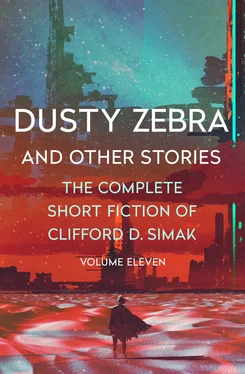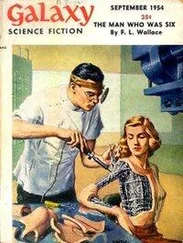As if in answer, a black object leaped from the belly of the plane and streaked earthward. Earth and dust billowed up in a flash of fire and rolling smoke. Another bomb was falling and again the hills echoed with the thud of a five-hundred-pounder.
The camouflaged planes were gone, fire licking through them.
Painfully, hopefully, Mason got back on his hands and knees and crawled. Maybe if he got up that hillside when nobody was noticing him, he might have a chance.
Another bomb shook the earth and Mason counted: “Three.” There was one left.
The explosion came. That was all there was.
An anti-aircraft cut loose and the Avenger howled in answer, howled, then stuttered with fiendish gunbursts.
Feet pattered behind Mason and someone bent to lift him.
“Me carry,” said N’Goni.
“N’Goni,” yelled Mason. “What are you doing here?”
But he didn’t wait for the answer, for, even as he spoke, a sound came that chilled his heart. The coughing of the Avenger’s motor.
Then he remembered. There had been only a little gas. Now that was used up. The ship would fall.
He struggled to his feet and watched, with a dull ache in his heart. The Grumman, prop barely turning over, was wheeling toward the very hillside where he stood. Plunging at them, faster and faster.
“Is that Steve?” shouted Mason at N’Goni. “Is that Steve in there?”
“Maybe,” said N’Goni. “Him go back. Hear guns. So him go.”
So Steve had come back. Had heard guns and had come back. Figuring he’d keep his gunner out of trouble, get him out of a mess.
The Avenger lifted its nose slightly as it hit the up-currents of the hillside, seemed for a moment almost to stall and then crashed no more than a hundred yards above them.
N’Goni was loping up the hill, eating up the distance, while Mason limped behind.
Down below the Jap base was ablaze, thick columns of smoke standing in the air. The parked planes were burning, gas dumps were belching thick black clouds.
A new sound stopped Mason in his tracks. The distant hum of many motors. A hum that grew until it was a roar and then a shriek
Streaming over the lip of the bowl was a formation of American bombers, bombers that howled down upon the Japs with blazing guns and a roar of bombs. Blindly Mason stumbled up the hillside.
N’Goni was helping Foster out of the Avenger and, through the blood that streamed from a cut across his forehead, the pilot grinned at Mason.
“You O.K.”” gasped Mason.
“Right as rain,” said Foster.
“But N’Goni, how did the Americans know? You couldn’t have gotten there and got back this soon.”
“Me send brother,” N’Goni explained. “Remember got to work for Jap. No work, Jap mad. Kill family, maybe. So send brother. Tell him what to say.”
“So that’s why you ran out on me,” said Foster.
N’Goni grinned. “Me remember quick. Mad Jap, bad Jap.”
“They aren’t mad now,” said Foster. “They’re just plain scared to death.”
The base was a froth of smoke and flame and bellowing motors as the Yank planes crossed and criss-crossed it, sowing destruction. With guns and bombs, the Japs were being wiped out. “You sit,” said N’Goni. “You watch. Me, too.”
He hunkered down, grinning.
“Grand stand seat,” said Foster.
This story was first sent to Horace Gold of Galaxy Science Fiction in mid-September 1950, but after Gold rejected it, Cliff sent it to Fred Pohl, then apparently acting as Cliff’s agent. John W. Campbell Jr., purchased it via Pohl the following March, paying $225, and it was published in the August 1951 issue of Campbell’s magazine, Astounding Science Fiction .
“Courtesy” is a morality tale, one that I believe represents yet another aspect of Cliff Simak’s reactions to World War II, so recently ended: the need to avoid thinking, and acting, as if you’re a member of a superior race. Yet “Courtesy” represents a puzzle for Simak fans, for while it’s one of the few stories in which Cliff apparently used characters who would reappear in a later story—“Junkyard,” published in 1953—you will see that if the stories are related, they were, strangely, not written and published in the correct order. (It’s true that Cliff sometimes reused character names, but this is not one of those cases; it is clear that they were the same characters; I lean toward the idea that Cliff actually began “Junkyard” first, but there is absolutely no evidence to support that speculation.)
—dww
The serum was no good. The labels told the story.
Dr. James H. Morgan took his glasses off and wiped them carefully, cold terror clutching at his innards. He put the spectacles back on, probing at them with a thick, blunt finger to settle them into correct position. Then he took another look. He had been right the first time. The date on the serum consignment was a good ten years too old.
He wheeled slowly, lumbered a few ponderous steps to the tent flap and stood there, squat body framed in the triangular entrance, pudgy hands gripping the canvas on either side.
Outside, the fantastic lichen moors stretched to gray and bleak horizons. The setting sun was a dull red glow in the west—and to the east, the doctor knew, night already was beginning to close in, with that veil of purplish light that seemed to fall like a curtain upon the land and billow rapidly across it.
A chill wind blew out of the east, already touched with the frigidity of night, and twitched the canvas beneath the doctor’s fingers.
“Ah, yes,” said Dr. Morgan, “the merry moors of Landro.”
A lonely place, he told himself. Not lonely only in its barrenness nor in its alien wildness, but with an ingrained loneliness that could drive a man mad if he were left alone with it.
Like a great cemetery, he thought, an empty place of dead. And yet without the cemetery’s close association, without the tenderness and the inevitability of a cemetery. For a cemetery held in scared trust the husks of those who once had lived and this place was an emptiness that held no memory at all.
But not for long, said Dr. Morgan. Not for long now.
He stood looking at the barren slope that rose above the camp and he decided that it would make an eminently satisfactory cemetery.
All places looked alike. That was the trouble. You couldn’t tell one place from another. There were no trees and there were no bushes, just a fuzzy-looking scrub that grew here and there, clothing the naked land in splotches, like the ragged coat that a beggar wears.
Benny Falkner stopped on the path as it topped the rise and stood rigid with the fear that was mounting in him. Fear of the coming night and of its bitter cold, fear of the silent hills and the shadowed swales, and the more distant and yet more terrible fear of the little natives that might this very moment be skulking on the hillside.
He put up his arm and wiped the sweat off his brow with his tattered sleeve. He shouldn’t have been sweating, he told himself, for it was chilly now and getting colder by the minute. In another hour or two it would be cold enough to freeze a man unprotected in the open.
He fought down the terror that choked his throat and set his teeth a-chatter and for an instant stood stock-still to convince himself he was not panic-stricken.
He had been going east and that meant he must go west to reach the camp again. Although the catch was that he couldn’t be absolutely sure he had been going east all the time—he might have trended north a little or even wandered south. But the deviation couldn’t have been enough, he was sure, to throw him so far off that he could not spot the camp by returning straight into the west.
Читать дальше












